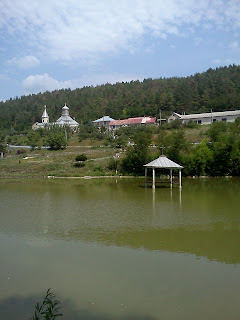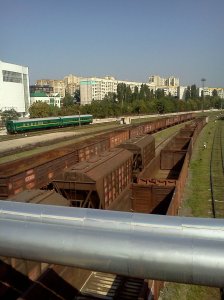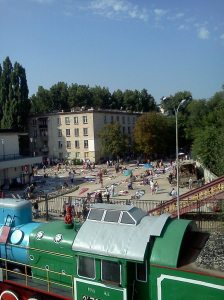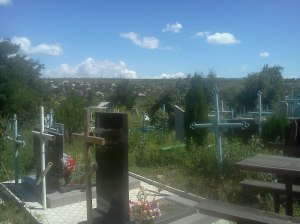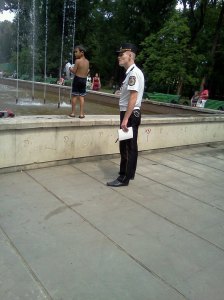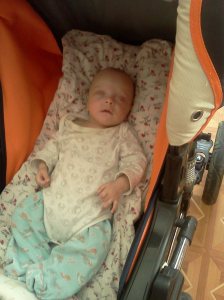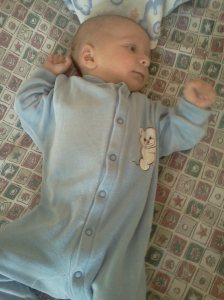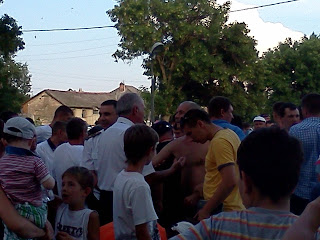The rest of the week was spent at the orphanage except for Wednesday when James and I went to the boys institution (called the Home for Disabled Boys in Romanian but it is far from anything resembling a home). Some of the boys (and I use that word lightly because most of the 'boys' we saw were over 18) made crafts and James wanted to buy some to see if he could sell the crafts in England. I also bought some crafts but I wondered how much of the money actually got back to the boys and if they do get it, do they have any opportunity to spend it. When I went before, I handed the money directly to the crafter himself. This time, we perused items in a separate room and handed over the money to the Vice Director who said she was giving us discounts. This worried me.
When we were driving up to the institution, we saw boys out in the yard, playing on seesaws and swings or sitting in groups. I tried to imagine life within the walls of the institution. They had comradeship for the most part, a nice yard, a pool (albeit only a quarter full of greenish water), and, I hoped, enough to eat. However, to me, this wasn't enough. If the oldest 'boy' at the home is 30, and they spend the rest of their lives there, they must not live very long lives.
The Vice Director had specific rooms picked out to show us. They were the same as last time. Other volunteers, after persistently asking to see other rooms, had been shown two rooms that were much starker than the happy, singing groups we visited. In the rooms they visited, the boys were either desperate for attention or sitting numbly in a chair rocking back and forth.
While we were waiting for the Vice Director, a group of 15 or so Scottish med. students piled out of her office. They were volunteering as part of a program at their University. About 30 students come over a 3 month period, staying two weeks at a time. We didn't get to ask much about their opinion of the institution but we saw them around quite a bit, playing with the boys.
The first room the Vice Director took us to had a group of boys who were sitting together singing Moldovan songs. The Vice Director, in front of the boys, explained to us that their brains worked fine but their bodies were disabled. Most of them had what was probably pretty mild forms of Cerebal Palsy or Scoliosis. If they had been born in America or the UK, they would be part of society-going to school, working, getting married, etc. But in Moldova, they will spend the rest of their lives in this institution.
The next group we visited wree less ambulatory. They were in wheel chairs or on beds. One boy was laying twisted on a bed. He was 25 years old and, because their was no way to lift him off the bed, he never moved from the position he was in. He couldn't speak to us but he eagerly answered questions from the Vice Director. My friend's organization Bettlyn Moldovan Relief is working hard to fundraise money for lifts and hoists for the institution.
In another group, an accordion player was entertaining the boys who were singing along. They were lined up outside. As I looked around the group, I realized few were wearing shoes that fit. In the past, I had spoken to a woman who had worked for an organization that helped boys from this institution get out on their own. The organization (Keystone Human Services) sets up a house for boys from the institution. They provide the boys with aides, life skills lessons, housing, etc. The woman I had spoken to mentioned that when the boys first came to live in the house they were so excited to have their own underwear. At the institution, all of the clothing is kept together. No one owns anything for themselves. Not even underwear.
Once again, my experience at the institution left me feeling conflicted. It was painful to see the plight of the boys. Most of them had spent their entire lives in orphanages and institutions. They didn't know what it was like to have a family, own their own things, be around girls who weren't caregivers, etc. And now we know that two of the boys at my orphanage will be headed to this institution in September. These two boys are so sweet, smiley, and loving. It breaks my heart to think of what will happen to them when they get to the institution. What is worse, they know they are going. They beg the volunteers to take them home. Even at 6 years old, they know that once they move to the institution their life will get worse.
I have been in Moldova for one week shy of three months. I chose that amount of time, hoping that giving my time to the children will make a difference. However, as I spent more time around the children I was with last year, I know it is not enough. The children I was with last year are almost two years old. None of them are speaking. They babble and some seem to understand what I say when I speak in Romanian, but most don't. There is an 18 month old little girl in the house where I am staying and when I compare her progress to theirs it is startling. When I go to their group every day, they are all sitting quietly on a rug on the ground. They are 2 year old toddlers who should be running, playing, digging, exploring, etc. But they sit. Each, with a cheap plastic toy in hand, clinging to it desperately and crying inconsolably when another child snatches it out of his or her hand. These are the children I rocked in my arms. I sang to and kissed. For two months straight, I held these children. But it wasn't enough. And it will never be enough. Until we find an alternative to orphanages, children around the world will be cheated out of their childhood. For more information on the detrimental effects of orphanages on children, scroll to the bottom to read an excerpt from my paper on social orphans in Moldova.
In closing, this summer has been a completely different experience from last summer. I am viewing things with new eyes. I've seen a lot of pain, but I have also seen a lot of hope. Each year, around 100 volunteers come to Moldova to work at the orphanage. Many come with visions on how to make their time and energy go further. It is my hope that, through the hard work of these volunteers, along with our hosts and other members of Service for Peace, we will make a difference in the lives of children growing up in orphanages. They will be held and kissed and hugged and entertained. And, most importantly, they will feel loved, even if it will be for the briefest of moments.
"The evidence about the detriment of institutionalized care on children's physical, psychological, biological, and emotional development is pervasive. According to Bilson and Cox, "Recent research in Romanian orphanages into the brain development of children aged less than 4 years shows structural changes that may explain the cognitive, socio-emotional, and behavioral difficulties that are observed in many children from such institutional backgrounds” (p. 38). What is more, according to Williamson and Greenberg, in a 2004 study, 32 European countries were surveyed and nine countries had in-depth studies about institutionalization of children. The results showed that, due to the “risk of harm in terms of attachment disorder, developmental delay and neural atrophy in the developing brain," the researchers "reached the conclusion that… NO child under three years should be placed in a residential care institution without a parent/primary caregiver,” (p. 6). By definition orphanages and institutions will continue to fail in providing children with one essential tool for brain, emotion, and physical development- a primary caregiver.
What is more, institutionalization is particularly harmful for infants. Children under the age of 3 represent a substantial percentage of the children living in orphanages in Eastern Europe (Childcare System Reform, 2009, p.4). Williamson and Greenberg write, "The first year of life is absolutely crucial for normal development, and the first six months of age is even more important than the second" (p.10). They continue by saying, "A particular shortcoming of institutional care is that young children typically do not experience the continuity of care that they need to form a lasting attachment with an adult caregiver" (p.5). Orphanages and institutions are unable to provide children with a primary caregiver, and are, therefore, harming children in significant and life-long ways.
One of the most harmful side-effects for infants growing up in orphanages is attachment disorder. As Kevin Brown explains it in his report on the risk of institutionalized care for children, attachment disorder is caused when there is no primary caregiver for a child to form a bond with. Attachment theory was first developed by John Bowlby in the 1960s. Attachment theory holds that without the ability to form an attachment to a primary caregiver, children will not be able to develop normally. Brown writes, "The human infant is genetically predisposed to interact with others, but for this process to result in optimal brain development the infant needs to interact with a caregiver who will handle, talk and respond to them in a sensitive and consistent way, repeatedly introducing new stimuli appropriate to their stage of development" (p.14). Therefore, without the ability to form attachment, the brain cannot physically develop. Brown writes, without attachment there is "no process to guide synaptic connections and the development of neural pathways. This leads to the pruning of synapses in those areas of the brain that are under-stimulated" (p.14). This directly affects the front and temporal lobes of the brain which control social interaction, emotions, and language (p.14-15). Therefore, infants growing up in orphanages actually suffer brain damage due to the detrimental effects of not attaching to a primary caregiver.
Brain damage is not the only harmful effect of growing up in an orphanage. Physically, the damage of living in an orphanage manifests as weight, height, and head circumference below the norm; hearing and vision problems; motor skill delays; head banging and rocking for comfort; poor health; physical and learning disabilities; etc. (p.10). Social behaviors found in children growing up in orphanages include: littler interaction with other children, no understanding of interactive play, sharing difficulties, aggression toward other children, inability to form attachments later in life, over-friendliness toward other children, etc. These behaviors are particularly significant in children under three who spent at least 6 months of their life in an orphanage (p. 12).
A study comparing the intelligence of children who have grown up in orphanages, been placed with foster families, or been reunified with their families shows the stark realities of the deprivation children growing up in orphanages suffer. According to the study, children living in orphanages scored dramatically lower on IQ test than children living with their biological families or being fostered. The mean score of children living in the orphanage was 77, which would be in the 'borderline mental retardation' classification. This was compared with children growing up in their biological families, who scored 103 on average. Children who had previously spent time in an orphanage but had been living with a foster family for the past 42 months scored an 86. Children who had been removed from the orphanage to live with a foster family before the age of 18 months scored a 94, compared to those who had been removed after 24 months, who scored n 80 (p. 14). The results of these IQ test manifest physically in delay in language acquisition, learning disabilities, and poor cognitive performances on tests (p. 14). This deprivation of brain development and cognitive skills will have lifelong effects on children growing up in orphanages.
Bragi Gudbrandsson writes, "Social orphan-hood may leave the most harmful scars in the mental life of a child" (p.5). These scars are not only developmental, Gudbrandsson writes, growing up in an orphanage, "can directly cause anxiety and person uncertainty, passivity, aggressiveness, and inclination to antisocial behaviour" (p.5). What is more, Gudbrandsoon mentions statistics from Russia showing that, "every fifth orphan who leaves an orphanage develops a criminal career, every seventh becomes a prostitute and ten percent of previous orphans commit suicide" (p.5). Clearly life after leaving the orphanage does not get any better. According to Bilson and Cox, children who grow up in institutions have higher rates of unemployment, teenage pregnancy, incarceration, poverty, homelessness, and drug abuse (p. 38). For many girls in Moldova, there are little options after leaving institutionalized care at the age of 16. Many of these girls are vulnerable to sex trafficking (Talbot, 2010, p.9). Williamson and Greenberg, also mention research from Russia showing, "one in three children who leaves residential care becomes homeless, one in five ends up with a criminal record and up to one in 10 commits suicide" (p.6) Children growing up in orphanages have been deprived of the necessary mental, physical, and emotional development to enable them to manipulate the world as an adult."
References
Bess, Amy, Lopez, Luisa & Tomaszewski, Evelyn. (March 14, 2011). Investing in those who
care for children: Social welfare workforce strengthening conference. NASW.
Bilson, Andy & Cox, Pat. (2007). Caring about poverty. Journal of Children and Poverty, 13:1,
37-55.
Brown, Kevin. (2009). The risk of harm to young children in institutionalized care. Better Care
Network.
Childcare System Reform. (November 2009). Analysis of the progress, remaining challenges and
trends in Child Care System Reform: Armenia, Belarus, Georgia, Moldova and Ukraine.
Chindea, Alin, Majkowska-Tomkin, Magdalena, Mattila, Heikki, & Pastor, Isabel. (October
2008). Migration in Moldova: A country profile. International Organization for
Migration: Switzerland.
Gudbrandsson, Bragi. (May 19, 2004). Children in institutions: Prevention and alternative care.
Working Group on Children at Risk and in Care.
Guzun, Aurelia. UNICEF CEE/CIS (2005). MOLDOVA: Hope for Marina: A ‘social’ orphan.
http://www.unicef.org/ceecis/reallives_3407.html
IOM. (March 2012). Frequently asked questions- Moldova, migration, trafficking. IOM
Moldova: Chisinau, Moldova
Moldoveanu, Elena. (May 31, 2009). Efforts to place orphans with families meets surprising
resistance in Moldova. Radio Free Europe/Radio Liberty.
http://www.rferl.mobi/a/1743564/full.html
Talbot, Elizabeth Peffer. (November 2010). The contributions of christians to the human
trafficking movement. North American Association of Christians in Social Work.
TransMonee. (2005). Data, indicators and features on the situation of children in CEE/CIS and
Baltic States.
Williamson, John & Greenberg, Aaron. (September 2010). Families, not orphanages. Better Care
Network.
UN. (February 24, 2010). UN guidelines for the alternative care of children.
UNICEF. (2010). UNICEF Annual Report for Moldova.
World Health Organization (WHO). (2012). Republic of Moldova.
http://www.euro.who.int/en/where-we-work/member-states/republic-of-moldova/facts-and-figures




